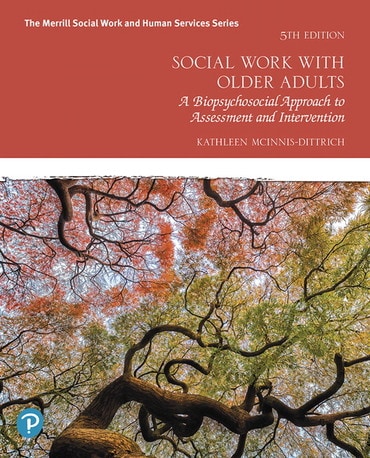
Title overview
For courses in aging and gerontology.
A practical, comprehensive approach to the major areas of social work with older adults
Social Work with Older Adults provides pre- and in-service social workers with a clear and engaging all-in-one resource for working with older adults. This practical and comprehensive text examines the basics of biopsychosocial functioning, the assessment of older adults' strengths, and the design of both traditional and alternative interventions to treat a wide variety of challenges facing older adults.
The 5th Edition includes a new chapter (13) that details the importance of community programs, as well as expanded coverage of culturally responsive practice throughout the text.
Hallmark features of this title
- CSWE Core Competencies and Practice Behavior overviews, examples, and applications related content to essential competencies and behaviors.
- Brief overviews cover concentration-specific practice behaviors and examples.
- Real assessment tools include suicidal ideation questions, the Lubben Social Support Scale, Mini-mental Status Exam, and the Geriatric Depression Scale.
- A variety of treatment protocols include Cognitive Behavioral therapy, life review, reminiscence, and group work and include nontraditional therapies.
- Topics related to social work with older adults include mental health (Ch. 6), spirituality (Ch. 10), substance use and abuse (Ch. 8), elder abuse and neglect (Ch. 9), end-of-life care (Ch. 11) and social and emotional needs (Ch. 12).
New and updated features of this title
- NEW: Integrated Learning Activities at the end of each chapter offer suggestions for class projects or individual papers. These activities promote the integration of material in the chapter with students' experiences in field practicum or community work.
- NEW: Case examples and vignettes discuss special concerns of older adults, such as depression, substance abuse, dementia, working with caregiver support systems, and advance directives.
- NEW: Discussion questions and activities involve students in active application of each chapters' new material.
- NEW: Chapter 13, Community Programs to Support “Aging in Place:” Age-Friendly Communities, Transportation, and Housing, discusses new efforts and programs to support the older generation in their current environments.
- NEW: New content on the unique challenges Baby Boomers will face as older adults includes a detailed discussion of the opioid crisis and Hepatitis C.
- UPDATED: Important key macro practice issues such as creating age-friendly communities, transportation, housing, income programs and health insurance, which are important to understand even in direct social work are covered in the final chapters. (See Ch. 13 and 14.) Expanded material on the decision-making capacity of older adults is integrated throughout the text.
Table of contents
- The Context of Social Work Practice with Older Adults
- Biological Changes and the Physical Well-Being of Older Adults
- Psychosocial Adjustments to Aging
- Conducting a Biopsychosocial Assessment
- Differential Assessment and Diagnosis of Cognitive and Emotional Problems of Older Adults
- Interventions for Depression, Anxiety, and Dementia in Older Adults
- Complementary and Alternative Approaches to Treating Socioemotional Conditions in Older Adults
- Substance Abuse and Suicide Prevention in Older Adults
- Social Work Practice in Identifying and Preventing Abuse and Neglect of Older Adults
- The Role of Spirituality in Social Work with Older Adults
- Advance Care Planning and End-of-Life Care for Older Adults
- Working with Older Adults’ Support Systems in Caregiving
- Community Programs to Support “Aging in Place:” Age-Friendly Communities, Transportation, and Housing
- Income Programs, Health Insurance, and Support Services for Older Adults: Challenges and Opportunities
Author bios
About our authors
Kathleen McInnis-Dittrich was an Associate Professor at the Boston College School of Social Work and Chair of the Older Adults and Families Concentration. She received her B.A. from Marquette University, her MSW from Tulane University and her Ph.D from the University of Wisconsin-Madison. She has extensive practice experience with older adults in community, residential and health care settings. She taught for 15 years at Marquette University and was on the faculty at Boston College since 1994. Dr. McInnis-Dittrich's writing and research is focused on clinical and macro practice with older adults. Her writing has appeared in Families in Society, Aging and Mental Health, The Clinical Supervisor, Social Development Issues, Migration Today, Journal of Women and Aging, Educational Gerontology, Race, Gender and Class and Journal of Teaching in Social Work. She is the author of 3 books: Social Work with Older Adults: A Biopsychosocial Approach to Assessment and Intervention, 3rd edition (Pearson, 2014), Integrating Social Welfare Policy and Social Work Practice (Brooks/Cole, 1994) and The Hmong in America: Providing Ethnic-Sensitive Health, Education and Human Service (Kendall-Hunt, 1990). She has also contributed to the Handbook of Social Work and Aging, the Cambridge Handbook of Sociology, Social Work Practice with Asian Americans and Collaborative Practice.